|
Stories & photos
by BOB DORAN THE MONTHLY MEETINGS of the Northern Humboldt Union High School District's school board don't usually draw much of a crowd. More often than not the board members and school officials sitting in front of the room outnumber the audience. But not last week. More than 100 people showed up for the board meeting held in the Arcata High School multipurpose room on Lincoln's birthday. The parents, students and community members had one thing on their minds -- sex, or more specifically, sex education, a topic that wasn't even on the agenda. A controversy began with a decision by Arcata High's principal, Bob Wallace, to cancel this year's performance by the Spare Change Theater Troupe. It was scheduled for a student assembly on Feb. 12, the same day as the school board meeting.
Spare Change Theater Troupe, from left: Jean O'Hara, Casey Carothers, Sarah Horwitz, Willoughby Arevalo, Max Lippmann. The troupe's seven students are part of a peer-to-peer education program of Six Rivers Planned Parenthood called the Teen Outreach Project (TOP). Other TOP students participate in Class-Act, offering classroom presentations to middle school students and freshman as part of heath education. Spare Change offers a teen's-eye-view of problems facing youth today. While the show is by no means explicit -- there's no nudity, no foul language, no depiction of sex acts -- the students do not shy away from difficult issues. Teen pregnancy, date rape, homophobia, masturbation and sexually transmitted diseases including HIV are addressed in a series of skits, some serious, some humorous. Principal Wallace saw the Spare Change show at Eureka High Jan. 10, the group's first performance of the season. In Wallace's opinion seven of the group's 11 skits were "off message." He describes the show overall as "extreme" and "controversial" and "not appropriate to many members of the student population." "In my role as principal I feel that I need to be responsible for the opinions and beliefs and value systems of all of the students at our school," said Wallace on Wednesday morning after the school board meeting. "Any time I would have basically a mandated assembly, I have to be inclusive of the opinions and values of all the students. Some people may be comfortable with the message being provided by the Spare Change Troupe; I believe and I know it to be a fact that there's another group who are extremely uncomfortable with their message, because that's not the way they see themselves in the world."
"The Education Code requires that there be a letter sent to parents if you're going to do anything related to sex education at the school," he explained. "I think last year there were maybe three students (who chose not to attend). "There were far more who expressed their concerns through the evaluations saying they didn't feel it was appropriate. Their show by nature is always going to be controversial because of the subject matter that they're dealing with. There were many people on campus who felt that the program was too extreme."
W allace claims that this year's show was "extremely controversial" at Eureka High, leading to complaints from students, faculty and parents. Bob Embertson, principal at Eureka High, says the controversy has been exaggerated. "Did I get lots of complaints? No. I had a complaint from one person who is a parent and also a school board member for our district who saw the show," said Embertson in a phone call Wednesday afternoon. "And I received two other calls -- one from a parent and another from a grandparent. That was it. Three calls out of maybe a 1,000 kids who saw the two performances. "I have been told there were some students who did not enjoy the show. I had no direct complaints from students. In fact the kids are the only ones who have moved on and aren't talking about it. We did have some kid singing one of the songs that they did, just as a kid-humor type thing." Embertson mentioned an exit poll assessing what the kids learned from the show "showed that a whole lot of kids paid attention." What were the messages the students received? Of the 135 students who filled out the exit poll, 63 percent said they were "more likely to wait to have sex"; 51 percent said they were "more likely to talk with their partners"; 49 percent said they were "more likely to use birth control"; 56 percent said they were "more likely to get tested for STDs"; 53 percent said they were "more likely to get tested for HIV"; 92 percent said they were "more likely to use protection" when they decide to have sex. Embertson thinks the Spare Change message is important because, while parents may be unwilling to face it, "the reality is, kids are sexually active, a heck of a lot more so than back when I was a teenager those many years ago." He does not minimize the complaints he did receive. "I think the concerns were legitimate. In some of the skits the point was a little obscure, at least for the adults," he said. Several adults from Eureka High staff who have children at the school attended the show. One told Embertson, `We have to remember, this is kids talking to kids. This performance wasn't intended for a middle-aged adult audience.' Another told him, "They (Spare Change) said things today that I want my daughter to know, but I have my usual adult hang-ups, and it's difficult for me to talk to my kid about these things." Lisa Pace is the parent/school board member who complained to Embertson after seeing the first of two Spare Change shows Jan. 10 at Eureka High. Her first complaint to the principal that day was about parent notification. She has three teens at Eureka High and only one of them brought home a note about the show. "My daughter brought home a note saying (there would be) `abstinence based skits.' I thought, `Oh, OK, that doesn't sound too bad.' But I had heard things about Spare Change before, so I went to watch it myself -- and I was appalled. There were some things that were covered fine, but a lot of it was in very poor taste. I think it gave the wrong message to children. "I wanted the message to be abstinence as the first choice because it leads to a healthier, happier life in the long run. But that was only covered in about eight seconds out of the whole hour presentation. The only thing that kind of covered abstinence was one skit where she said it was powerful being single. It didn't really say abstinence; it just said `I don't have to have a partner.'" Sarah Horwitz wrote the abstinence monologue. She took a break from her volunteer work Wednesday afternoon at the Open Door Teen Clinic to explain what she was getting at in the skit. "Among teens there's this kind of attitude where you have to have a boyfriend, you have to have a partner, you have to be with someone or be looking for someone or be willing to make out with someone whenever because you must be desperate if you're not already with someone. To me the `single piece' addresses not having sex, but it's more than that. "It's about feeling proud of being self-sufficient and not needing to even have a crush on some boy -- not just that you're not wanting to have sex with someone, but that you don't even have to want to have anything to do with anyone if you don't want to. I think there's power in that," said Horwitz. "I don't think anyone in the media is telling women today that's it's powerful to be single. I think that message is richer than simply abstinence. If some parent didn't get it because it didn't have the word `abstinence' in it, I'm sorry, but I think it's very clear to the students what the message is: `Right on if you're single' -- and by single we don't mean making out or having sex with a different person every night." Another Spare Change member, Alexa Punnamkuzhyil, was volunteering at Teen Clinic for the first time that afternoon. She pointed out that other skits in the show have a very direct abstinence message. "Even though the word abstinence is not always used, our message is that your actions bring consequences: If you use drugs, if you drink alcohol and don't think about your actions, if you don't use protection, something bad will happen. This is shown throughout the play." The framework for the show is a call-in radio program on a faux station, KSTD, where people ask questions about sexually transmitted diseases. One portion deals with genital warts, an increasing threat among teens. Since condoms do not provide complete protection, the caller says she and her boyfriend have decided not to have sex. "Dr. Sarah" tells her, "Well, sweetie, I have to say abstinence is the only 100 percent sure-fire way to not contract any STDs or get pregnant, for that matter. For our other listeners, let me clarify a few things " After explaining that, foolproof or not, "condoms will protect you more than using nothing" and offering some advice about getting tested, the "doctor" concludes, "My recommendation is to wait until you are 100 percent ready physically and emotionally to have sex. There's no hurry, dear. Believe me, you've got plenty of time." Pace complains, "They didn't really concentrate on relationships. It was more about -- you know, sex. They had this one skit where they used the guy from TV, Crocodile Hunter. They did a little skit where the guy had his wife there and they captured an alligator, a stuffed alligator, and they showed how to put a condom on the alligator's tail. They were saying, `Catch the wild one.' And I don't know, is that the place to show kids how to put a condom on? It just didn't seem right to me." Pace would rather see parents take responsibility for sex education, particularly something like condom use. Dr. Ann Lindsay says that's unrealistic. Lindsay was the first person to speak out for Spare Change at Tuesday's school board meeting. As chief health officer for the Humboldt County Department of Health, she sees the problems connected with teen sexual activity first hand. She thinks Spare Change provides a valuable public service.
Many teenagers are not aware that the state provides free medical services, including birth control, and parent notification is not required. This is particularly important for those who are already sexually active because some of them are carrying diseases without knowing, Lindsay said. In particular, public health officials have made fighting chlamydia a high priority. (See Journal cover story, "A dangerous place to live" -- Oct. 4, 2001.) "We have a high rate of chlamydia infection -- the fifth highest in the state -- approximately 300-350 cases reported per year. Most of the cases are in 15- to 22-year-olds. People in that age group tend to have more partners and take more chances. It gets passed around," said Lindsay. The disease is quite infectious and often goes unnoticed since you can have it without symptoms. While chlamydia is not deadly in itself, it can be disastrous; untreated it can lead to sterility. And its spread is an indication of the prevalence of unprotected sex that can cause far more serious problems -- HIV, for example. "We've given money to Spare Change because we think that they are the most effective way of communicating information to students," said Lindsay. "There's new testing available that is urine-based so it doesn't require a pelvic exam. That makes testing really easy, and Spare Change has been one of our main ways of reaching out to kids. We want kids to know if they're sexually active, they need to get tested. Whether they have symptoms or not, they should get tested once a year." Lindsay credits Spare Change and TOP for getting teens to come in for testing, for teaching them about condom use, and she praises the group for opening up dialogue on issues like the link between alcohol and rape and intolerance of homosexuality. "Humboldt County has a high suicide rate and in young people suicide is often associated with sexual identity issues. I think Spare Change has a sensitive portrayal of that issue as well," Lindsay said. Ironically several of the skits that Lindsay sees as most valuable touch on issues that Pace would prefer were left out. "There were a lot of gay and lesbian messages (in the show)," said Pace, "and I understand the point: they're trying to increase tolerance. But then, were they encouraging children to become gay and lesbian even if they're not? I'm wondering what the message was. (They had this whole dance skit about that.) I was embarrassed." Pace concedes that if it were up to her, the school would use abstinence-only sex education. "I think it sends a better message," she said. "I think they need to keep themselves concentrating on their school and increasing their talents and don't get caught up with this other stuff that they are really not ready for because they are young children. They need to be aware of making good healthy choices for a happy life." Horwitz agrees that teens need to make healthy choices, but since some are already sexually active, she would like to see them choose to use places like the Teen Clinic as a resource for information about birth control options and to get tested for STDs. She said she welcomes efforts by groups like Arcata High's Crossfire Club, a campus Christian organization, that encourages youth to be abstinent -- as long as it's not just about shame. "I don't believe in teaching teenagers to be ashamed of themselves no matter what they're doing," Horwitz said. "We need to inform them because information is power. Knowledge is power. We have to assume, regardless of what we want kids to do, they are going to do things that are unhealthy. And we want them to know what to do in those unhealthy situations. We want kids to know where to go. "It's like Mothers Against Drunk Driving; they provide a phone number you can call if you are ever in a situation where kids are drunk and you don't have a ride home. I think that's beautiful because it acknowledges that kids are going to drink. "We say, `If you're going to have sex, this is what you need to know.' Of course we should tell them that not having sex is the safest choice and we tell them that. We should also tell them what they can do if they are having sex. If we don't provide them with the information they need to protect themselves, then we take power away from them." For Lisa Pace the most disturbing skit was one that the Spare Change students intended as a humorous look at an alternative type of safe sex. It's a topic that got the surgeon general of the United States, Dr. Joycelyn Elders, fired by President Clinton in 1994. It's the same topic that got advice columnist Ann Landers in hot water with some readers in 1993. Both women spoke in favor of masturbation. "The last rap song was about four or five minutes long about masturbating `morning, noon and night,' Pace said. "I looked back at my daughter and her girlfriend and they were crawling. I guess they were embarrassed. I asked other teenagers and they thought it was really stupid. One said it was funny." Pace complained about the skit and others to the principal and spoke with Spare Change director Jean O'Hara. "I told Jean, `We aren't animals. You know not everybody masturbates. We can control ourselves.' They were leaving the impression that we can't -- we can't help it. And we can. `Masturbate morning, noon and night?' I mean, hello? We can control ourselves." In a conversation at the Planned Parenthood offices in Eureka, O'Hara explained that the masturbation song was something the young people suggested adding this year. "They see it as another form of abstinence, one that holds no risk of STDs, pregnancy, etc. It's totally safe. I told them it would be controversial and some schools wouldn't allow it. They said that was OK." O'Hara emphasized the fact that the troupe is flexible and willing to adapt to a variety of community standards. She says that flexibility was demonstrated in Eureka. "They played the show twice," said Pace, "and I talked to the principal between the two. They pulled `The Masturbate Song' and another skit in response to my complaints and replaced them with something else." That flexibility will be put to the test again soon. Spare Change is scheduled to perform for Fortuna High freshmen in March. Fortuna High Principal Rich Tomasini is a little bit wary. While there have never been complaints from Fortuna parents or students about Spare Change, Tomasini saw last year's show and thought it "almost went beyond the line." This year he heard through the grapevine about Pace's complaints and about the cancellation of the Arcata performance. "I think the students that put these performances on mean well, and they're trying to get a message across to the kids, but sometimes they kind of go beyond what they maybe should go beyond," said Tomasini. "They want to be explicit and entertaining to keep the kids' attention. But as adults we have to look at it and say, `Well, we could have done that differently.'
Tomasini wants to read the revised scripts, bounce them off a committee of staff and students for feedback and make a decision. "We still might say, `We don't want this or that,' and they'd have to make a decision if they want to do it or not." In Arcata, Wallace has left the door open for further discussion suggesting that it's possible he would allow Spare Change to perform for an "open assembly" perhaps during lunchtime. Friday he met with O'Hara and other Planned Parenthood officials to discuss the possibility. Wallace and other school officials will view one of the public performances of a revised Spare Change show Wednesday, Feb. 27, at the Arcata Veteran's Hall just around the corner from Arcata High. Horwitz says she will continue to offer advice to her peers whether Spare Change performs at Arcata High again of not. Her classmates know that she's approachable and they can ask her almost anything. "Since I was little, since I was a 5th grader and girls in my class started getting their periods, people have been coming up to me and asking me questions about sex and sexuality, partly because my mother is a nurse, but also just because kids ask each other. "I've always felt absolutely empowered by the fact that I actually have real information to give them."
Colin Powell talks CONDOMSTHE ISSUE OF CONDOM USE HIT THE national spotlight Friday when Secretary of State Colin Powell was answering questions from teenagers via satellite for a show broadcast on MTV. When asked by an Italian teen about his thoughts on the Catholic Church's position on condom use, Powell said, "In my own judgment, condoms are a way to prevent infection, and therefore, I not only support their use, I encourage their use among people who are sexually active." This put Powell at odds with the Bush administration, which favors an abstinence-only approach to sex education. President Bush's budget plan for 2003 asked for $135 million, a 33 percent increase for abstinence-only material. This fulfills a campaign promise to spend as much money on abstinence as on comprehensive sex education and contraceptive programs for adolescents. Powell went on to say, "It is important that the whole international community come together, speak candidly about it, forget about taboos, forget about conservative ideas with respect to what you should tell young people about." According to an Associated Press report, White House spokesman Ari Fleischer downplayed the difference between the president's views on abstinence and Powell's frank talk about condoms saying, "There's of course a group of people who are going to be sexually active no matter what anybody in the government or anybody's family says about abstinence. The president's point is they both need to be highlighted." IN THE NEWS | ELECTION 2002 | CALENDAR Comments? E-mail the Journal: ncjour@northcoast.com © Copyright 2002, North Coast Journal, Inc. |

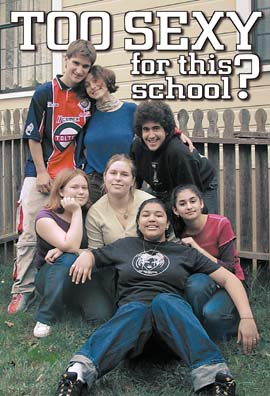
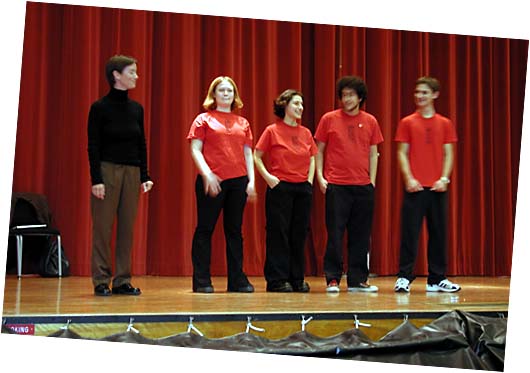
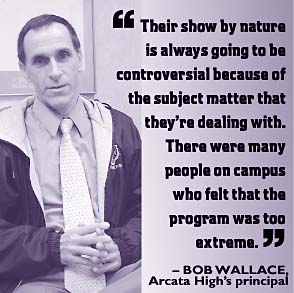 Wallace
concedes that calling the assembly "mandated" is somewhat
misleading. Attendance at a Spare Change performance is optional
and requires parent notification.
Wallace
concedes that calling the assembly "mandated" is somewhat
misleading. Attendance at a Spare Change performance is optional
and requires parent notification.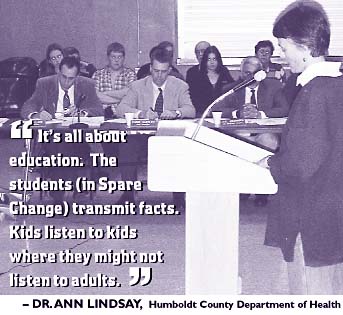 "It's
all about education," said Lindsay Wednesday morning. "The
students (in Spare Change) transmit facts. Kids listen to kids
where they might not listen to adults. They make a vocabulary
available for kids to discuss these issues with their intimate
friends and their families. They hook other students in with
teen-oriented health care services."
"It's
all about education," said Lindsay Wednesday morning. "The
students (in Spare Change) transmit facts. Kids listen to kids
where they might not listen to adults. They make a vocabulary
available for kids to discuss these issues with their intimate
friends and their families. They hook other students in with
teen-oriented health care services."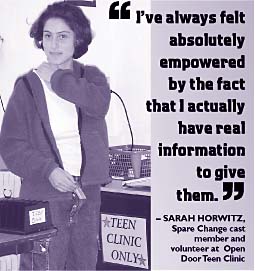 "It
may be offensive to some students, where to others it's not.
Here in the Fortuna area we have three or four real strong churches
that feel pretty firmly about family values and that type of
thing. So we end up on a tightrope balancing between what's appropriate
and what's not. I was not going to have the performance done.
Then I talked with Debbe Hartridge [education director] at Planned
Parenthood. She said they were going to take some of the offensive
stuff out."
"It
may be offensive to some students, where to others it's not.
Here in the Fortuna area we have three or four real strong churches
that feel pretty firmly about family values and that type of
thing. So we end up on a tightrope balancing between what's appropriate
and what's not. I was not going to have the performance done.
Then I talked with Debbe Hartridge [education director] at Planned
Parenthood. She said they were going to take some of the offensive
stuff out."